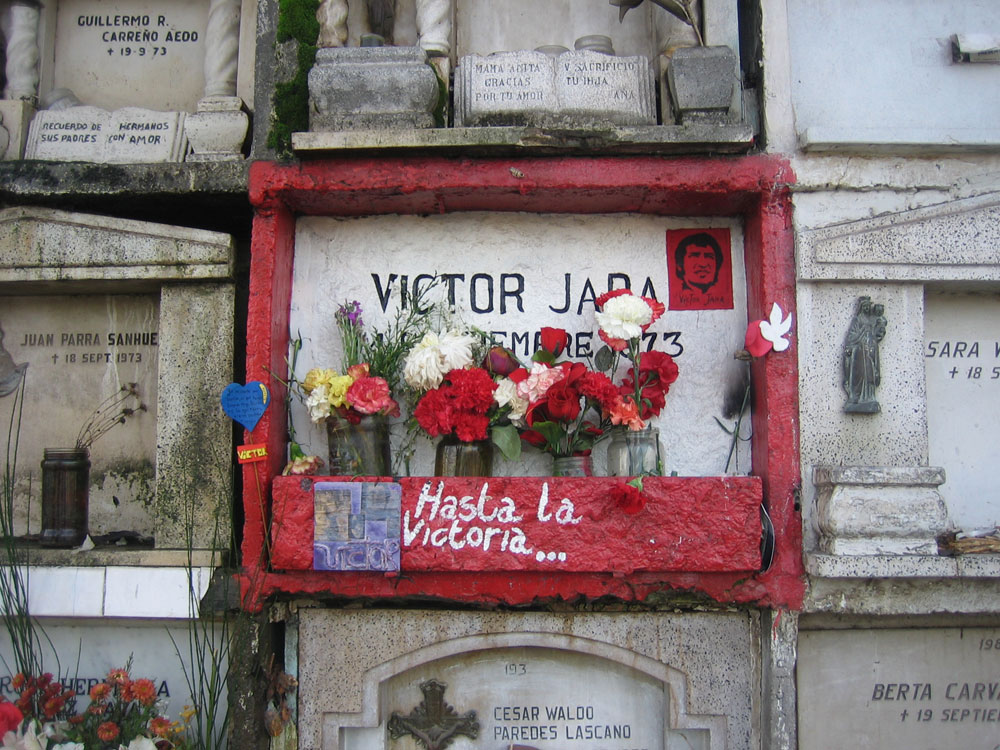
November 1, 2019; Washington Post
A few days ago, during a protest in Santiago, Chile, the crowd began to sing a song from their country’s past. In 1973, the country’s democratic institutions were overthrown by a military coup, resulting in a 16-year dictatorship led by General Augusto Pinochet. The violence that rained down included the death or “disappearance” of thousands of people. One was a singer-songwriter by the name of Victor Jara, who wrote a song called “El Derecho de Vivir en Paz,” or “The Right to Live in Peace.” That song became an anthem of the anti-Pinochet movement, and now it is rising again.
In many ways, the title of the song seems to capture the essence of why protests have erupted in Chile. A recent collaborative version of the song made by current performers adds some slogans from today’s protests to the original lyrics.
At issue are many of the same concerns facing the US. These include growing income disparity, the decline of the middle class, and inadequate access to quality education and healthcare.
As Alisha Holland, a Harvard political scientist, writes in the Washington Post, though it may superficially appear like the protests were caused by a modest hike in the subway fare, the roots of the unrest go far deeper, back to the days of Pinochet and the constitution adopted during his regime. (While Chile’s dictatorship ended in 1989, the constitution adopted during that dictatorship still governs the country.)
Income disparities in Chile remain quite stark: the worst in the Organization for Economic Co-Operation and Development (OECD), which regularly reports on economic and ecological conditions among its 40 member countries. (The United States ranks fourth-most unequal). Its recent report on Chile raised a few red flags about the quality of life in that country. These include the adjusted disposable income, which at almost $17,000 per household, ranks 35th out of the 40 member countries.
In education, 65 percent of adults aged 25–64 have completed the high school level, well below the OECD average of 78 percent. According to Holland, this is due at least in part to the creation of districts where people are now segregated by class. Under Pinochet, the less wealthy population was moved into new, remote areas of Santiago, for example. In 1979 alone, Holland writes that the military government removed 29,000 families from the city center and moved them to the far west and south sections of the city. In an education funding system that will be familiar to US readers, services provided to the population, including public schools, are locally funded, and the wealthiest district spends eight times more per capita than the poorest.
Sign up for our free newsletters
Subscribe to NPQ's newsletters to have our top stories delivered directly to your inbox.
By signing up, you agree to our privacy policy and terms of use, and to receive messages from NPQ and our partners.
Perhaps the voices of the protestors explain things better and more simply. One said:
I want change and I want it now. The cost of living keeps rising and our money is badly distributed—in pensions, in healthcare and in education. There is privilege for armed forces, the priests, the politicians, the corporations. And to change that? You have to change the constitution.
The subway system links the poorer outer areas of the city with the central districts. However, the central areas are where many of the jobs are, so poor people rely far more on the subway to get to work, and bear the greater brunt of the fare hike. As another protester said, “We have shitty wages and 12-hour shifts. It takes me two hours to get back from work, and when I get home, I don’t see my daughter, because she is asleep.”
The cycle of protests, which has led to 18 deaths and 7,000 arrests to date, has been developing quickly in Chile. It has had to withdraw as host to two international conferences. President Sebastián Piñera has replaced eight cabinet ministers to include younger and more liberal ministers. He has also pulled back the proposed transit fare hike and is instituting other policy changes. But it may be a case of “too little, too late,” as the protests persist during the day, the violence continues at night, and a constitutional challenge is now being brought against his government.
An 18-year-old student sums it all up, saying:
I am fighting for a better education that costs less, a subway fare that is fair, and a life with more dignity. Because what we earn now is not enough to survive on. I want to become [economically] independent but I can’t—life is just too expensive. I want to be a student, to live in peace—these are little things.
As Victor Jara wrote, it’s about the right to live in peace.—Rob Meiksins













